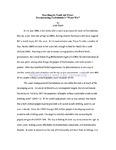| dc.rights.license | In Copyright | en_US |
| dc.creator | Stoehr, Jacob S. | |
| dc.date.accessioned | 2013-12-20T14:26:56Z | |
| dc.date.available | 2013-12-20T14:26:56Z | |
| dc.date.created | 2004 | |
| dc.identifier | WLURG38_Stoher_POV_2004_wm | |
| dc.identifier.uri | http://hdl.handle.net/11021/26038 | |
| dc.description | Jacob S. Stoehr is a member of the Class of 2004 of Washington and Lee University. | en_US |
| dc.description | Capstone; [FULL-TEXT FREELY AVAILABLE ONLINE] | en_US |
| dc.description.abstract | The water inadequacies of Cochabamba are not unlike the reality of much of the developing world. . . . The key is finding the best way to maximize the right to clean water: making access affordable, environmentally sustainable, and economically feasible. In order to deconstruct the case of Cochabamba and learn from its failings, two aspects of water must be understood: water must be seen as a right, and water must be seen a social and an economic good. From this framework, the events of Cochabamba will be presented from two perspectives in an attempt to establish the facts, which can then be analyzed. The two perspectives stem from interviews and writings taken from both sides in order to gain the most objective view. Speaking out against the failures surrounding the "water war" is Jim Schultz, who lives in Cochabamba, Bolivia and experienced the events first hand. The Bechtel Corporation, whose role in the Cochabamba fiasco is undeniable, presents a different story. Jonathan Marshall, a media relations manager at Bechtel, provides insights into the other side of the story. Through the individual opinions and critiques of these individuals, as well as a variety of other sources, the facts of the case can best be assembled for objective discussion. [From introductory section] | en_US |
| dc.format.extent | 22 pages | en_US |
| dc.language.iso | en_US | en_US |
| dc.rights | This material is made available for use in research, teaching, and private study, pursuant to U.S. Copyright law. The user assumes full responsibility for any use of the materials, including but not limited to, infringement of copyright and publication rights of reproduced materials. Any materials used should be fully credited with the source. | en_US |
| dc.rights.uri | http://rightsstatements.org/vocab/InC/1.0/ | en_US |
| dc.subject.other | Washington and Lee University, Shepherd Poverty Program | en_US |
| dc.title | Searching for Truth and Water: Deconstructing Cochabamba's "Water War" | en_US |
| dc.type | Text | en_US |
| dcterms.isPartOf | RG38 - Student Papers | |
| dc.rights.holder | Stoehr, Jacob S. | |
| dc.subject.fast | Bechtel Corporation | en_US |
| dc.subject.fast | Bolivia -- Cochabamba | en_US |
| dc.subject.fast | Human rights | en_US |
| dc.subject.fast | Right to water | en_US |
| dc.subject.fast | Water rights | en_US |
| dc.subject.fast | Water-supply -- Management | en_US |
| dc.subject.fast | World Bank | en_US |
| dc.subject.fast | Public-private sector cooperation | en_US |
| dc.subject.fast | Environmental justice | en_US |
| local.department | Shepherd Poverty Program | en_US |
| local.scholarshiptype | Capstone | en_US |
